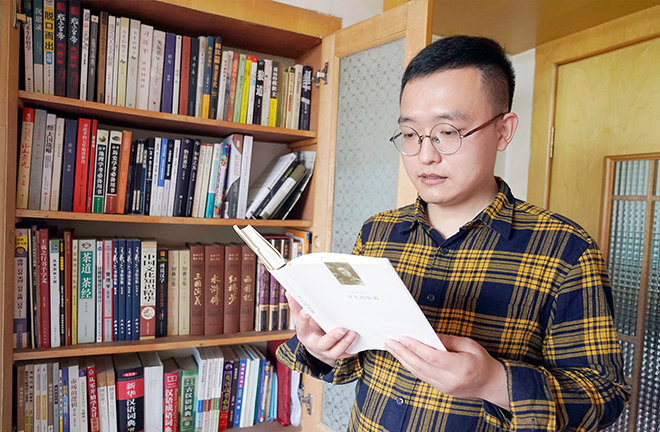Ethical literary criticism matures

Chen Weihao, a bus driver in Xi'an, Shaanxi Province, likes reading in his spare time. In particular, he appreciates Lu Yao’s The Ordinary World and takes its core values as his life mottoes. Photo: CFP
Ethical literary criticism is a literary criticism theory and method established by domestic scholars, built on the basis of Western ethical criticism and Chinese moral criticism. At present, ethical literary criticism is gradually maturing. Progress has been made in constructing theoretical and discourse systems and in producing critical practice results, further expanding the academic influence of ethical literary criticism.
Ethical literary criticism believes that literature originated from the need for ethical expression, and it is a unique expressive form of ethical ideas and moral life at specific historical phases, said Nie Zhenzhao, the founder of ethical literary criticism, who is also executive vice president of the International Association for Ethical Literary Criticism and director of the Center for Interdisciplinary Studies of World Literature at Zhejiang University.
The function and value of literature lies in providing ethical teachings, Nie continued. It achieves the teaching purpose of exhortation, praise, punishment, and warning through a series of moral examples, so as to encourage people to choose the ethical path of abandoning evil and doing good. Ethical literary criticism is a reflection, deconstruction, reference, and innovation of existing literary criticism theories, an effort made by Chinese scholars to construct original literary criticism theories and methods with Chinese characteristics, Nie added.
"Ethical literary criticism is a critical theory and method which recognizes the ethical essence and teaching functions of literature from an ethical perspective, and, on this basis, reads, understands, analyzes, and interprets literature," said Liu Ying, a professor from the College of Foreign Languages at Nankai University. Based on natural selection, ethical literary criticism develops ethical choice theory and constructs a critical discourse system centering on such terms as ethical choice, ethical identity, ethical environment, free will, and rational will.
According to Wang Songlin, a professor from the Faculty of Foreign Languages at Ningbo University, ethical literary criticism has challenged the traditional theory that "literature originates from labor" in domestic academia. Most domestic scholars of literary theories tend to regard labor practice as the origin. However, ethical literary criticism has raised questions, holding that labor is only a form of production activities, which can be a condition for the origin of literature and art, but cannot constitute a causal relationship.
The ethical literary criticism theory was proposed as a response to the crisis of Chinese literary theories in the 1980s, when three worrying tendencies appeared in Chinese literary criticism: the "aphasia" of literary criticism; literary criticism away from literature; and the lack of morality, especially a sense of social moral responsibility, in literary criticism. Ethical literary criticism was put forward by Nie in 2004, who argued that literature is essentially an art about ethics and emphasizing the teaching function of literature and the social responsibility of literary criticism, Liu continued.
The proposal of ethical literary criticism showcases the cultural, academic, and critical consciousness of Chinese scholars. At present, the field's theoretical system is increasingly improved, said Zhu Zhenwu, a professor from the School of Humanities at Shanghai Normal University.
Chinese ethical literary criticism has had a widespread influence on international academia. International scholars such as Leonard Harris, a professor from Purdue University in the United States, have participated in related research, while prestigious international academic journals have published papers on Chinese ethical literary criticism.
In order to truly win the respect and acknowledgement of international academic circles, we should provide enlightenment not merely for problems in Chinese literature research, but also settle those common to world literature studies. To truly exert influence and gain status in international academia, we must continue to develop and innovate with academic theories and discourse systems. We must closely connect with China's reality, adhere to Chinese characteristics, and, at the same time, uphold a global perspective, Nie suggested.
Traditional Chinese literary theories contain many classic opinions, such as "literature is an immortal undertaking for governing a country" from Cao Pi (187–226), the emperor of Cao Wei, and "writing is for conveying truth" from the writer Zhou Dunyi (1017–1073). Built on rich Chinese literature and art theories and textual genetics, ethical literary criticism itself incorporates Chinese elements. With a profound practical and textual foundation, ethical literary criticism can be applied to both Chinese and foreign literary works, Zhu noted.
After close to two decades of development, today's ethical literary criticism has a complete theoretical discourse system, with a complete set of terminologies and concepts, such as the sphinx factor, ethical identities, ethical taboos, ethical lines and ethical knots, and ethical choice. Scholars of ethical literary criticism have selectively utilized and appropriately modified the discourse of Chinese mythology, classical Chinese literature, and ancient Chinese literary and art theories, aligning itself with the paradigms of contemporary literary and artistic thoughts. It represents new thoughts in literary criticism, inspired by the collisions and exchanges of Chinese and Western literary theories, Liu concluded.
Edited by YANG LANLAN
